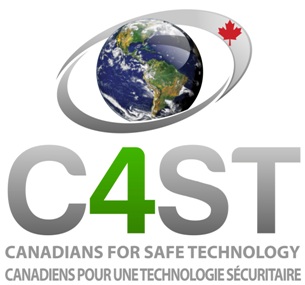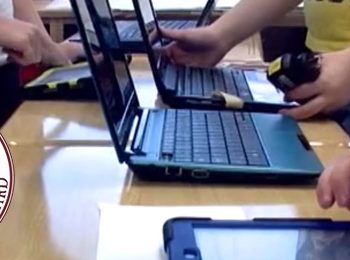
ON, Halton District School Board (HDSB)
- 0 Comments
C4ST Takes Aim at Wi-Fi in Schools
As students returned to school Tuesday, Oakville-based Canadians for Safe Technology (C4ST) took to the streets to voice concerns about student safety. Several C4ST members handed out pamphlets outside Kenollie Public School in Peel to raise awareness of the possible health impacts of unrestricted Wi-Fi in schools. Read the full article here.
Update: July 22nd, 2014
Halton District School Board Writes to Health Minister Ambrose Regarding Safety Code 6.
Read the letter here
Update: June 1st, 2014
With the review of Safety Code 6 by the Royal Society of Canada, and the release of their results on April 1, 2014, parents of the Halton District School Board expressed their concerns regarding the review of Safety Code 6 and the numerous conflicts surrounding the report. Specifically, parents expressed concerns such that it is prudent for the HDSB to urge Health Canada to follow international scientific best practices in the final review of Safety Code 6, including full transparency as to how data was sought, selected, weighed and synthesized to answer specific questions. In addition, parents expressed their concerns that there should be disclosure of interests of all panel members and Health Canada scientists involved in the revision of Safety Code 6. On May 21, 2014, the Halton District School Board Trustees passed a motion endorsing the following:
RECOMMENDATION
Be it resolved that the Chair and Director of the Halton District School Board on behalf of the HDSB of Trustees write to Health Canada to reinforce and encourage prompt investigation and follow-up to The Royal Society of Canada Expert Panel’s recommendations regarding “A Review of Safety Code 6 (2013): Health Canada’s Safety Limits for Exposure to Radiofrequency Fields”.”
This is a positive and prudent step by the Halton District School Board.
The concerns raised are important points for consideration when it comes to ensuring public health and safety, particularly of students and staff, who are enveloped in technology daily during school. As school boards move forward with learning in a technologically wireless world, it is important to reiterate that the boards are a steward of education and as such must ensure that the health, safety and well-being of students and staff remain paramount.
Summary
The Halton District School Board (HDSB) introduced the wider implementation of wireless (Wi-Fi) technology in approximately 2010. The HDSB’s vision for 21st century teaching and learning is to install in all schools, elementary to secondary, Wi-Fi technology. It has done so without proper consultation with parents.
The HDSB “supports the use of Wi-Fi in its schools and administrative offices in order to provide connectivity to resources and improve communication”. Wireless coverage has been provisioned for at least 60% of each building.
Wi-Fi is installed in every HDSB school including portable classrooms. The long term plan is to have complete Wi-Fi coverage throughout every school. The HDBS states that accommodations cannot be made for students whose parents request they are taught in an area where there is no Wi-Fi.
The HDSB has failed to consider the harmful effects of Wi-Fi on both its students and staff.
In June 2011, Trustee Nancy MacNeil brought a motion to the board to have Wi-Fi banned in the HDSB schools. It was defeated 10 to 1.
In November 2013, Trustee Nancy NacNeil brought a second to the board. It read:
RECOMMENDATION
Be it resolved that the Halton District School Board reduce its student’s exposure to “wifi” in its elementary schools by:
- Having the “wifi” turned on only 45 minutes at the beginning and 45 minutes at the end of each school day and turned off for the remainder of the day.
- Having the “wifi” turned off in areas of the school where the very young – the JK, SK, and grade one students are classed, and also where those students with learning disabilities are located.
- Not allowing the building of any communication (cell) towers on Halton District School Board land or installing them on any buildings.
This motion was also defeated 10 to 1.
Wi-Fi has a multitude of negative and harmful effects on people, especially on young children, whose skulls are significantly smaller and thinner than grown adults. This allows for a greater amount of radiation to be absorbed into children’s brains, and could cause serious long term physical and mental health effects. The World Health Organization / International Agency for Research on Cancer, has classified radiofrequency electromagnetic fields as possibly carcinogenic to humans. This means that we are exposing our children to these harmful emissions on a daily basis without any up to date or standardized codes for safe use / safe exposure to this type of radiation.
Parents have contacted trustees and school officials regarding Wi-Fi concerns over the years and some have withdrawn their children from the HDSB due to children’s health issues being affected by Wi-Fi. Many people have concerns, including teachers themselves, yet few are speaking up to raise the issue and awareness.
The HDSB is failing to adopt a precautionary principle: “The precautionary principle or precautionary approach states if an action or policy has a suspected risk of causing harm to the public or to the environment, in the absence of scientific consensus that the action or policy is harmful, the burden of proof that it is not harmful falls on those taking an act.”
On April 1, 2014, Health Canada concluded that it should “aggressively” research the possible link between wireless airwaves and cancer and should inform Canadians how they can limit their exposure to such electromagnetic fields while using cellphones, an expert scientific panel recommends.
As concerned parents, we are asking the HDSB to adopt a precautionary approach and avoid or limit the use of Wi-Fi. Similar objectives can be satisfied with hard-wired Internet connections. As trustees put forward future motions regarding valid health concerns, we urge you to contact your school officials and political officials to raise your concerns.
Visit this page often for updates and news regarding this issue.
- Link(s):
- Halton Public Schools Retain Use of WiFi
- Uphill Climb for Wi-Fi Restrictions in Halton’s Public Schools
- Decreased Time of Wi-Fi Usage for Halton’s Public Schools
- WiFi Puts Our kids at Risk, Parents Contend
- WiFi Debate Continues (Global News Feature)
- Former Microsoft Canada President agrees school Wifi is a Potential Health Hazard
- Elementary Teachers’ Union Updates Electronic Device Policy
- C4ST Takes Aim at Wi-Fi in Schools



